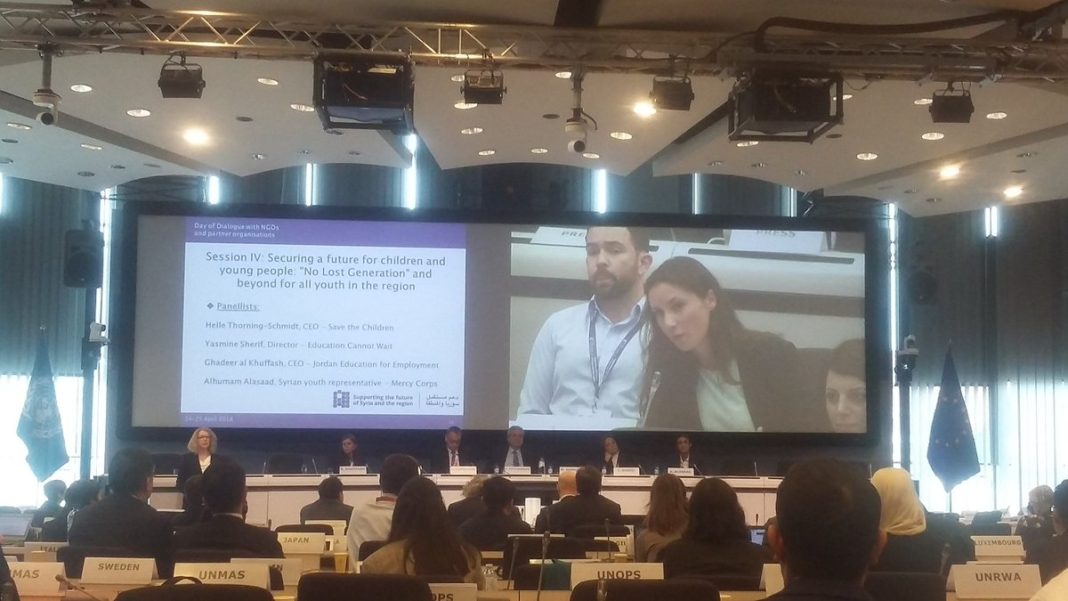A lack of concrete pledges to resettle refugees from Syria by governments outside the region at the Brussels Conference could undermine a series of positive developments to respond to the needs of crisis-affected people in Lebanon including international funding announcements and policy commitments by the Government of Lebanon, according to NGO networks representing over 70 Lebanese and international organisations.
Speaking at the close of the Supporting the Future of Syria and the Region Conference in Brussels, George Ghali from ALEF said: “resettlement figures have dropped dramatically in the last year, yet Syrians continue to be displaced daily from their homes. The Brussels Conference did little to redress this failure by the international community. Governments around the world should step up and provide resettlement to 10% of the refugee population if we are to believe that they are serious about sharing responsibility for the humanitarian response to the crisis.”
The Government of Lebanon, with support from the international community, committed in Brussels to improve protection for refugees, including access to legal residency; ensure access to quality, affordable health care for the most vulnerable Lebanese and refugees through a resilient healthcare system; improve the quality of education available for children and youth; and to facilitate NGOs’ work as part of the crisis response.

“If the conference participants can make good on their word, it will go a long way to improving the living conditions for vulnerable Lebanese and refugee populations who continue to bear the brunt of the crisis. The Government and its international partners should swiftly adopt a monitoring framework to track progress and ensure that we are delivering for those most in need”, said Camilla Jelbart Mosse from Lebanon Humanitarian INGO Forum.
“Lebanon has made bold commitments toward helping refugees obtain legal residency and birth registration, but far from the meeting rooms in Brussels, refugees are still struggling to secure legal stay and frequently live in fear of eviction. We all have a lot more work to do, and clearing the way for resumption of UNHCR registration would be a great place to start”, said Mike Bruce from the Norwegian Refugee Council.
The investments in infrastructure and associated reforms agreed at the recent CEDRE conference in Paris provide a major opportunity for Lebanon’s economic development. However, the Lebanese and donor governments in Brussels failed to capitalize on this by setting out concrete steps that would deliver employment opportunities for vulnerable people.
Nadine Saba, from the Akkar Network for Development, said: “Employment is the main concern for Lebanese youth, while unemployment is one of the main drivers of tension between Lebanese and refugee communities. The government should adopt a decent work agenda as part of its efforts to expand the Lebanese economy aimed at creating safe and dignified jobs, including as part of intensive employment schemes linked to infrastructure projects, and tackle the exploitative conditions that vulnerable people have become increasingly exposed to”.
A delegation of 25 representatives of civil society in Lebanon attended sessions at the Brussels Conference, including from the Lebanese NGO Forum, Lebanon Humanitarian INGO Forum and the Working Group on People Affected by the Syrian Refugee Crisis.

Available for interview:
George Ghali, ALEF, +9613885003, George.Ghali@alefliban.org
Camilla Jelbart Mosse, Lebanon Humanitarian INGO Forum, +96170996652, coordinator@lhif.org
Nadine Saba, Akkar Network for Development, +9613271056, nadinesaba@gmail.com
Mike Bruce, Norwegian Refugee Council, +961 81666174, mike.bruce@nrc.no
Virginie Lefevre, AMEL Association, + 961 718 555 93, research@amel.org





 Creative Commons Attribution 4.0 International license
Creative Commons Attribution 4.0 International license